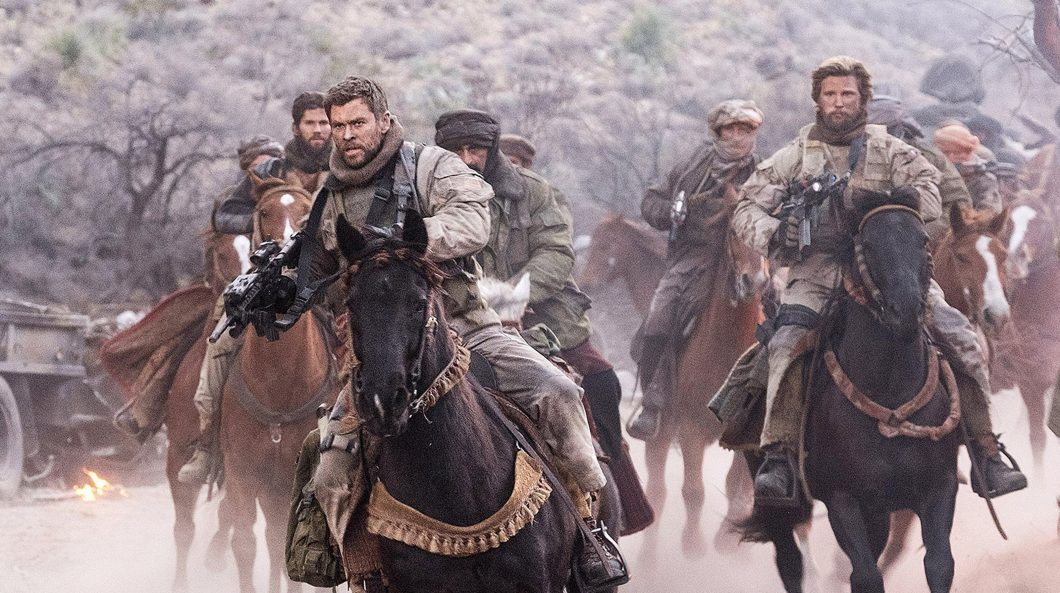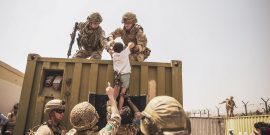American politicians and strategists regularly fail to plan for restoring order after the fighting stops - Nadia Schadlow explains why.
12 Strong: The American Soldier as Strong, Intelligent and Compassionate
It’s a telling sign that the new film 12 Strong has a divided rating on the movie rating website Rotten Tomatoes, with only 54 percent of critics liking the film while 73 percent of audiences do. The film depicts the American soldier as not only brave but highly intelligent, as well as empathetic and engaged in a just battle. It’s the kind of pro-military message that has made liberals, many of whom review movies, uncomfortable since at least the Vietnam War.
I recently spoke to Chief Warrant Officer Bob Pennington (retired), whose is portrayed in 12 Strong by actor Michael Shannon. Pennington was one of a dozen Special Forces soldiers (Green Berets) who choppered into northern Afghanistan after 9/11. Their mission, Task Force Dagger, was to embed themselves with warlords in the Northern Alliance and radio coordinates of Taliban strongholds to U.S. bombers. Mounted on horseback, the U.S. team secured the city of Mazar-i-Sharif, which set up the U.S. and its allies for a full-scale invasion of Kabul.
In the film Chris Hemsworth plays Captain Mitch Nelson, who is based on Major Mark Nutsch, the leader of Operation Dagger. Their superior in Afghanistan is Colonel Mulholland (William Fichtner), who tells the men, “Nineteen men made war against the U.S. on 9/11. You 12 will be the first ones to fight back.” Based on the book Horse Soldiers by Doug Stanton, produced by Jerry Bruckheimer and directed by Nicolai Fuglsig, 12 Strong is an entertaining film that works on all levels. It’s said that a film is made or broken in the editing room, and 12 Strong has an engaging, steady pace thanks to editor Lisa Lassek. Cinematographer Rasmus Videbaek captures the alien terrain of Afghanistan, contrasting it with the comfortable blue hues of home and America. The cast is extremely likable and the score by Lorne Balfe is solid.
Like American Sniper, Lone Survivor and 13 Hours, 12 Strong recaptures the reputation of the American fighting soldiers from the decades of Leftist representation that followed the Vietnam War. In 1970s and 1980s films like The Deer Hunter, Coming Home, Platoon, and Born on the Fourth of July, war veterans were dramatized as psychotic, violent, addicted to drugs and deeply angry at America.
“They did depict us in the right light,” Pennington said of 12 Strong when we spoke shortly after the premier. “It’s not that guy who’s a killer, and goes in there like a madman. These guys know they have to face the enemy and that they have to kill the enemy. There’s no time for remorse, there’s no time to rejoice. The faster we do this, the faster we win, the faster we go home. I could not be more proud of all of them.”
I note to Pennington that the soldiers in 12 Strong are shown to succeed not just through bravery and violence, but intelligence. In a key scene, Captain Nelson is given command of the Task Force Dagger operation not because he kicked over a cabinet in anger, but because he has done his research and understands the terrain and weather of Northern Afghanistan better than anyone else. “Out of five people we talked to about this,” Major Mullholand tells him, “You’re the one who got it right.”
Pennington agrees, offering that what is not shown in 12 Strong is the depth of research and preparation done every single day on the mission:
Mark [Nutsch] and I and the team Sergeant talked out what we had to do in the next day’s event. This was ongoing. It wasn’t just Mark or one guy deciding what to do. Prior to going in, every one of those detachment members read all the information they could possibly get their hands on. They were so in tune with Afghanistan that we would sit down and talk amongst each other. That’s how it works. In Special Forces it’s a team reaction. The team sits down. There is a period when we go into isolation. The team that is entrusted with the mission must first prove themselves by isolating in a room that is closed off, but sending out questions they have to intelligence staff. It’s 96 hours of just hammering the staff. It’s every one of those enlisted guys on the team. We’ve been picked for the Super Bowl. America is looking up to us. We’ve got to perform. It’s humbling when people thank you, but there’s a lot of homework.
This is a unique film in that it captures the approach Army Special Forces take in preparing for war, offering a picture of the deep-dive work they undertake to train and prepare themselves and to lead local forces. It’s the opposite of the trigger-happy loner shown in so many post-Vietnam films.
There’s also humor in 12 Strong. The film shows the jokes of fighting men, one-liners and razzing that can come out at odd times, mostly as a way of coping with such an intense situation. When the twelve Task Force Dagger troops arrive in Afghanistan, one of the service men whose been in country for a couple weeks already asks them where the hell they have been. “At a Nickleback concert,” one of them shoots back, a reference to a much-maligned rock band. (This got a huge laugh even at the press screening I attended). During a battle Northern Alliance warlord General Dostun, played by Navid Negahban, actually calls his enemy, Taliban commander Khaled (Fahim Fazli), and says, “The Americans are here. Fuck you.” According to the Pennington, this actually happened.
The negative critical reaction to 12 Strong has been interesting. It seems based on the feeling that the film is too patriotic. “12 Strong is a straight-up, unalloyed shot of movie patriotism for the Make America Great Again sector of the American movie audience,” Michael Phillips of the Chicago Tribune wrote – an interesting take, considering that for years Donald Trump has loudly been against foreign wars. Critic David Edelstein condemns the “sin of omission that’s unforgivable” — that 12 Strong doesn’t talk about the men, many of whom served in Afghanistan, who died in “the unnecessary, criminally bungled occupation of Iraq, courtesy of such men as Donald Rumsfeld….A true memorial to the Horse Soldiers would show not just their triumph, but the larger tragedy of successful templates arrogantly discarded and all those lessons unlearned.” Critic John Liu was put off by the lack of “soul searching” in 12 Strong, a criticism that is just flat-out wrong. In one scene Nelson seems to be quietly grieving over killing people, even if they are Taliban. A fellow warrior tells him, “If you don’t feel anything you’re not human.”
The negative reactions to 12 Strong indicate that many movie critics prefer the Vietnam paradigm of a film like Oliver Stone’s Platoon, in which the mission is never clear and America is as bad as the enemy. These are films that validate the Left’s bad faith in America, a bad faith that for decades was passed off as virtue. That kind of treatment of U.S. servicemen seems thankfully over, as it is as unrealistic as the bloodless, hyper-patriotic war films of John Wayne that it replaced. Furthermore, and as I noted to Pennington in our interview, and he enthusiastically agreed, in 12 Strong the enemy is actually every bit as evil as they are depicted. The Taliban does in fact shoot women and terrorize children for trying to get an education.
Pennington ended our conversation with the observation that Afghanistan isn’t perfect but is much better off today than it once was. He also expresses deep respect for the indigenous people he fought side by side with: “They are very tenacious fighters. You land on the ground and you see these fighters, you understand, they want to fight. They are willing to fight and willing to die for freedom. They want their kids to come out and play and not be hidden in caves. I cannot say enough about them. Those men deserve more credit than we can ever give them.”
As do the American men who helped them in the fight.



